- 11 March 2016
- Africa
-
(아프리카) 남수단의 전사들은 전투에서 승리하면 급여 대신 여성을 강간해도 된다아름다운 인생/여성 2016. 3. 13. 02:26
출처: http://www.bbc.com/news/world-africa-35780777
South Sudan: Women raped 'as reward for fighters'
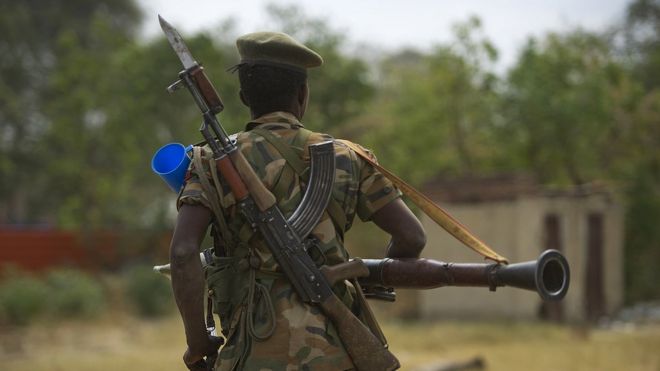 Getty Images
Getty ImagesSouth Sudan's army has been accused of suffocating more than 60 people (suffocate: 질식사하다/시키다. be suffocating 날씨가 숨막히게 덥다) Militias allied to the South Sudanese army have been allowed to rape women in lieu of wages while fighting rebels, a UN report says. (militia: 민병대, 의용군) (in lieu of~: in stead of~: ~ 대신에) 남수단군 협력 민병대는 전투 시기 봉급대신 여성들을 강간해도 된다는 허락을 받았다.
Investigators found that 1,300 women had been raped last year in oil-rich Unity State alone, it said.
The army operated a "scorched earth" policy to deliberately target civilians for killing and rape, which amounted to war crimes, the UN said.
The government denies its army targeted civilians but says it is investigating.
According to the UN report, militias operated under a "do what you can and take what you can" agreement that allowed them to rape and abduct women and girls as a form of payment.
They also raided cattle and stole personal property, it added.
'Killed for looking' 바라봤다는 이유로 죽임을 당하다
The scale and type of sexual violence committed in South Sudan constitute some of the most horrendous human rights abuses in the world, UN High Commissioner for Human Rights Zeid Ra'ad Al Hussein said (horrendous: 참혹한) (human rights abuses: 인권유린
- One woman said she had watched her 15-year-old daughter being raped by 10 soldiers after her husband was killed
- Another said she had been stripped naked and raped by five soldiers in front of her children on the roadside
- Witnesses told investigators that several women had been abducted and held in sexual slavery as "wives" for soldiers in the barracks (witness: 증인, 목격자) (barrack: 막사, 병영)
- Young-looking women were specifically targeted and raped by about ten men, one witness said. In some cases, those who tried to resist or even looked at their rapists were killed, she added (young-looking: 젊어 보이는, 어려 보이는)
The UN said government forces and allied militias had gang-raped girls and cut civilians to pieces. It also accused opposition fighters of committing human rights abuses.
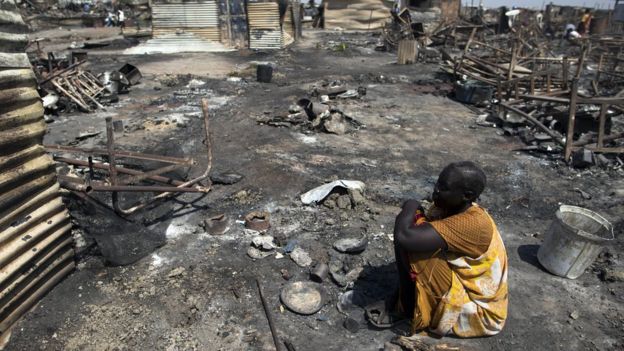 AFP
AFPMore than two million people have been displaced by the fighting President Salva Kiir's spokesman, Ateng Wek Ateng, told the BBC there were no militias fighting on the government side.(밝은 하늘: 남부단 정부측에선 그런 사실이 없다고 말하나, 사실은 그와 정반대일 것이다. 이것이 어느 나라 정부나 자기들의 추한 진실은 국민들에게 밝히지 않는 좋은 예이다.)
The investigators had relied on anti-government elements as South Sudanese soldiers only fought people in uniforms, not civilians, Mr Ateng told the BBC's Focus on Africa radio programme.
While the government disputed the report, he added, the allegations it contained were "too serious to ignore" and the government would take appropriate action.
In a separate report, Amnesty International said more than 60 men and boys had been suffocated in a shipping container by government forces.
Researchers from the UK-based campaign group said bodies of those suffocated had been dumped in a field after they were killed last October in Leer Town, Unity State.
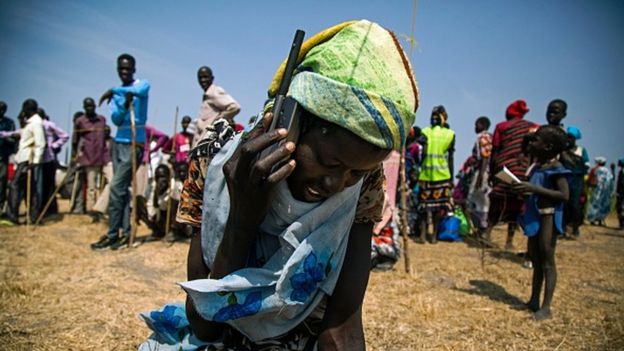 Getty Images
Getty ImagesMore than 40% of South Sudan's population is in need of food aid "Dozens of people suffered a slow and agonising death at the hands of government forces that should have been protecting them," said Lama Fakih from Amnesty.
"These unlawful killings must be investigated."
The civil conflict erupted in December 2013 after Mr Kiir accused his sacked deputy, Riek Machar, of plotting a coup.
Mr Machar denied the allegation but then formed a rebel army to fight the government.
Tens of thousands have died and more than two million have been displaced since then.
Amid a threat of sanctions from the UN, the two sides signed a peace deal in August last year but are yet to form a transitional government of national unity.
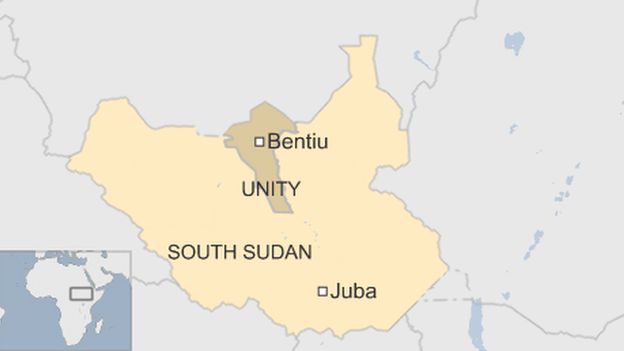
Q&A: South Sudan conflict
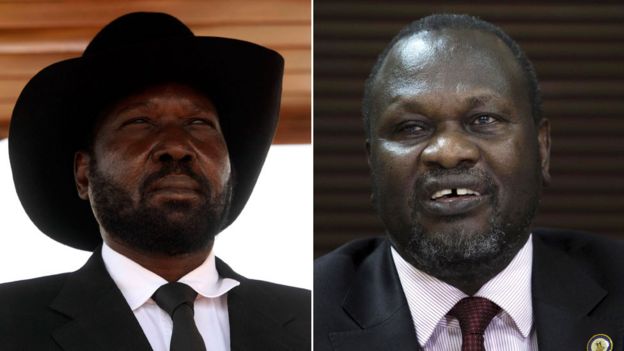 Reuters
ReutersRivalry between Mr Kiir (L) and Mr Machar transformed into open conflict in late 2013 What is South Sudan fighting about? The world's newest nation gained independence from Sudan in 2011. But two years later the country descended into violence after President Salva Kiir accused his sacked deputy Riek Machar of plotting a coup. Mr Machar denied this but then formed a rebel army to fight the government. The East African nation is rich in oil but it is also one of the least developed regions on earth - only 15% of its citizens own a mobile phone.
Why is the conflict so vicious? Millions of South Sudanese have known hardly anything but war. Before the country broke away from Sudan, the first north-south civil war lasted from 1955-1971, and the second was even longer (1983-2005). Ethnic tensions are largely the main source of the latest conflict and have deepened animosity between the Nuer and the Dinka, the country's two biggest ethnic groups.
What is being done? Several internationally brokered peace agreements were violated by the warring factions in the past. However, in August, the government and the rebels signed a power-sharing agreement, essentially fine-tuning a return to the status quo. But eight months later, the transitional government is yet to be formed.
Read more about the conflict
'아름다운 인생 > 여성' 카테고리의 다른 글
(여성) 위키피디아: 전족(묶을纏발足) (0) 2016.05.14 (아프리카) 여성할례 당한 여성들이 이후에 겪는 고통들 (0) 2016.04.24 (아프리카) 남아프리카 시장 순결지킨 여학생에게 장학금 지급 (0) 2016.02.10 (미국/동영상) 미군내 여성 성폭력을 고발하는 동영상 The Invisible War (0) 2016.02.05 (여성) 감비아 대통령 여성할례 금지 (0) 2015.11.26